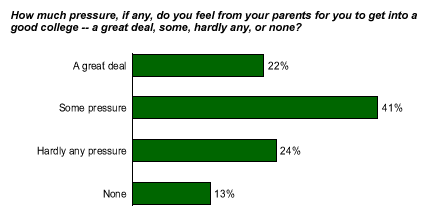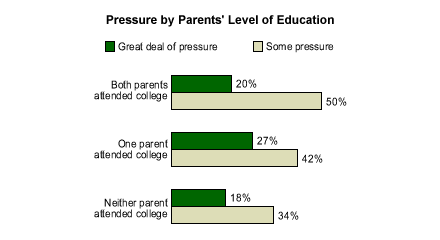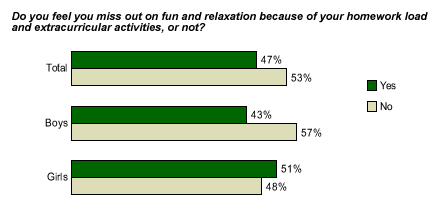Talk about pressure. Louis Menand, Pulitzer-Prize winner and distinguished professor of English at the City University of New York, wrote in a recent article for The New Yorker, "There are a great many reasons that college admission has become so complex, but the main one is demand." Menand also said that in 1932, 1,300 people applied for admission to Yale and 72% were accepted. Last year, 15,466 applied and 13% gained admission. And these numbers aren't limited to the Ivy League -- applications are sky-high at colleges all over the country.
Â鶹´«Ã½AV recently asked teens, aged 13 to 17, about the amount of pressure, if any, they felt from their parents to get into a good college. Nearly two-thirds of all American teens say their parents put "a great deal" (22%) or "some" (41%) pressure on them.

Teen girls and teen boys say they feel about the same amount of pressure from their parents to get into a good college, as do black teens, Hispanic teens, and white teens. However, responses do vary according to parents' educational attainment. Roughly 7 in 10 teens who had one (69%) or both (70%) parents attend college say they feel a great deal or some pressure to get into a good college. This compares with just 52% of teens who had neither parent attend college.
Students who say they are "near the top" of their class feel about as much pressure (67%) from their parents to get into a good college as do those who say they are "above average" (65%) or average (64%). The data suggest -- though they are inconclusive -- that students whose reported class standing is "below average" feel less pressure in this regard.

Not that parents are the only source of college-admissions pressure teens may feel. Far from it. "Maybe my parents applied a little pressure for me to get into a good school, but they didn't need to," says Emily, a high school senior who is heading for Bucknell University next fall. "I put enough pressure on myself. All my friends were applying to top colleges and the whole atmosphere at school is about getting in."
Where's the Fun?
As if the academic pressure to get good grades and high SAT scores weren't enough, teens begin lining up their advanced placement courses and extracurricular activities long before senior year -- many hoping to stand out in the applicant crowd. Veronica, a high school senior who will attend Washington University next year, says that during one year she was in two plays, choir, played field hockey, ice hockey, took fencing lessons, and rowed with the high school crew team. Even though she enjoyed all those activities, she admits "in the back of my mind I could see all those things on my resume." Even if Emily feels she was able to balance her time fairly well, her mother, Sue Anne, sees it differently. "It varied quite a bit from year to year," she says. "Some years, when she was participating in three seasons' worth of sports and taking many accelerated or AP courses, she seemed overly stressed out and expressed a longing for more leisure."
Slightly less than half of American teens, 47%, say they feel they miss out on fun and relaxation because of their school and extracurricular activities, but 53% say they do not. This holds true across age, region, and level of parents' education. Girls are slightly more inclined than boys to say they miss out on fun and downtime. Additionally, black teens (41%) are somewhat less likely to say they have less time to relax and miss out on fun than white teens (49%) and Hispanic teens (47%) are.

On this issue there are also differences according to teens' self-reported class standing, with those saying they are near the top (55%) slightly more likely to feel they miss out on fun and relaxation due to school obligations than those who are above average (44%) or average (48%) in class standing.
Sleep also appears to be sacrificed to academic and extracurricular pursuits. As discussed in an earlier article (see "Wake Up, Sleepy Teen" in Related Items), when Â鶹´«Ã½AV asked teens if they "miss out on needed sleep because of homework and extracurricular activities," the results indicated that a slight majority (52%) of teens who identify themselves as "near the top" or "above average" feel they do, compared to 43% of "average or below-average" students. Overall, 47% of teens say they miss needed sleep because of the demands of school and extracurricular activities.
Bottom Line
Although the word pressure usually has a negative connotation, it is not necessarily a bad thing in the context of teens and college. According to Emily's mother, high standards should always be encouraged. "I think that some amount of pressure is a good thing," she says. "Any adult in this culture knows that a college degree is now pretty much a prerequisite for making your way in the world, and if the degree is from a good college, all the better."
*The Â鶹´«Ã½AV Youth Survey is conducted via an Internet methodology provided by Knowledge Networks, using an online research panel that is designed to be representative of the entire U.S. population. The current questionnaire was completed by 1,200 respondents, aged 13 to 17, between Jan. 23-Feb. 10, 2003. For results based on the total sample, one can say with 95% confidence that the maximum margin of sampling error is ±3%. For a complete description of the sampling and weighting procedures used to conduct the survey, click .